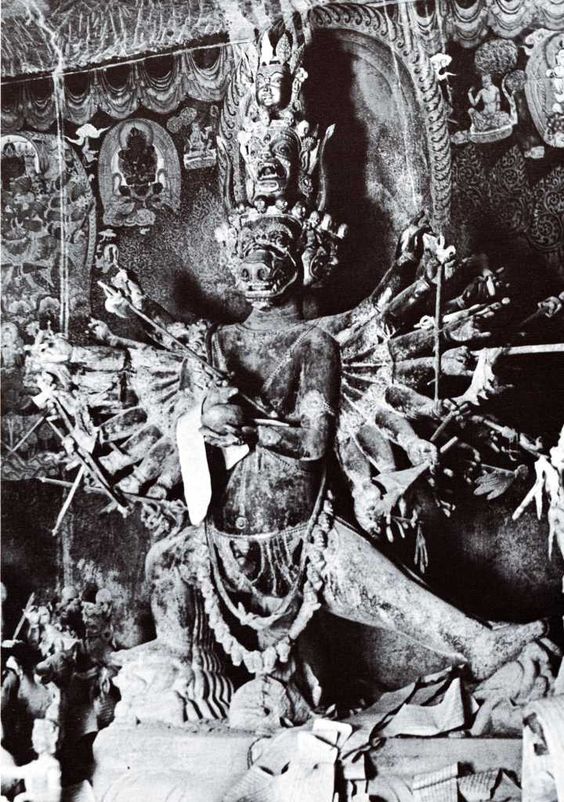Observations: This text was originally crafted in Portuguese and later translated into English in a non-professional manner.
Buddhist Socialism: Beyond Compassionate Policies
Shaku Shin Gi

Much has been said about the social and economic system of Buddhist Socialism, its relation to communist anarchism and Marxism, and how we can construct public policies to dismantle capitalism and the social structures of selfishness based on the ethical foundation of Buddhism and the Bodhisattva ideal. While these reflections are crucial, this brief essay aims to delve deeper into the ultimate meaning of Buddhist Politics.
In Buddhism, the Bodhisattvas’ task is to liberate all beings from suffering and illusory bonds. When discussing a Buddhist socialist structure, we often focus on the first part: freeing beings from the suffering of capitalism. Here, I will delve into the second part: how Buddhist Socialism implies the social transformation of all existing illusory views.
We can say that Buddhist Socialism is, in Marx’s words, “the real movement which abolishes the present state of things,” meaning the movement that abolishes everything that exists. Beyond bourgeois views and culture, the task of Buddhist Socialism is the abolition of all Mara’s illusions. This means that our ultimate enemy, more than capitalism, is “Maraism” – everything anti-Buddha: the selfish system (capitalism), social hierarchies, the self (both as a political individual and as the mirage created by the 5 skandhas), eternalism, nihilism, scientific materialism, etc.
Buddhist Socialism should not merely be a secular movement; it is the application of Buddhism to politics, a political-religious or religious-political movement. While this movement synthesizes socialist authors (both from Marxism and anarchism), what we seek are only the most politically coherent tendencies with Buddhism. This means that this ideology is founded on Buddha, not on any modern socialist thinker. The “Socialism” in the designation is only a contemporary explanation of our position. This definitely does not imply a forced state promotion of Buddhism or a desire to suppress and prohibit other beliefs and non-beliefs (which would not be compatible with Buddhist doctrine). It means only that our movement is based on Buddhist teachings, and we believe they should underpin society in general or a particular society.
Where can we see this existing real movement? Within Buddhist Sanghas. Although the Sangha is not typically consciously political, Buddhism’s work to end illusory reality is a real movement applied to the “individual” – here meaning the Sangha participants, so it remains a collective movement but limited to a specific group. Sanghas, functioning as spiritual socialist islands amid globalized secular capitalism, are true lotus flowers born in the mud. As Buddhist socialists, we want to extend this movement to a social level, a true Buddhist Revolution in all aspects and forms.
This revolution implies denying the illusions sold by Maraism, ranging from a stateless, moneyless, classless society to more unpredictable forms, such as mental integration through future technologies or a life more connected to nature. This abolitionist movement is gradual, does not happen overnight, and faces many obstacles. We do not know how these denials will materialize, but we should not view a socially welfare society with Buddhist touches as the end but as a means to apply Buddhist reality to a new social form.
In the end, all we know is that it will be a reality entirely different from what we have now. A reality that allows and breathes transcendence and enlightenment at all times. A reality transformed in all its aspects and forms, which, as we know from the Buddhist teaching of impermanence, is a society that will constantly change, even if self-contradictory and never reaching an end. This signifies the end of social dukkha or the system that promotes it. A society where we can welcome the coming of the Buddha Maitreya.
Illusion is the keyword here. The revolutionary transformation of Buddhist socialists, while material, is also subtle. It is a transformation of Being and how it relates to the world, how we exist in this universe. It is the possibility of reaching our maximum capacities and, at the same time, not clinging to any form of existence. By realizing Buddhist Socialism, we can finally fulfill the Bodhisattvas’ task of not only liberating all beings but liberating everything. A liberation not done by us as an external movement but done by Everything itself. A liberation that recognizes the interdependence of all phenomena.
We know that saving Samsara is not possible and that the nature of this existence is dukkha. We do not intend to change the samsaric nature but to create a society based on liberation, where beings are born into a pre-condition of salvation, a nirvanic society that simulates Pure Lands but is aware of its own nature of suffering.
Buddhism is true total liberation in all spheres of existence and being. It is the ultimate freedom from matter, suffering, capitalism, attachment, selfishness, and the self.
Namo Amida Butsu.
“Through your great exaltation, use even all your wealth
Such that the exalted become free from pride,
[The equal] become delighted,
And the inclinations of the lowly are reversed.”
Nagarjuna, Precious Garland, No. 312.

